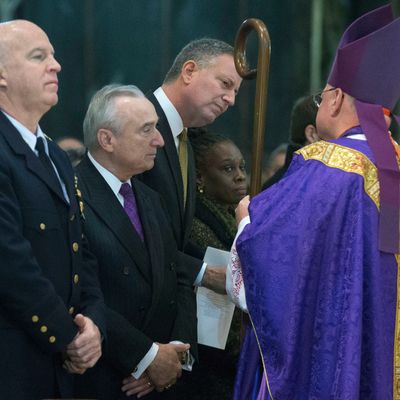
Bill de Blasio was never baptized and, as an adult, does not belong to a church. His wife, Chirlane McCray, told me last year, “I do consider myself to be a spiritual person, but I don’t really want to talk about it. It’s very easily misconstrued.”
Whatever the specifics of their own beliefs, the mayor and the First Lady sincerely respect the role and power of religion. And so there they were this morning, in the front pew at St. Patrick’s Cathedral, at a moment when the city was greatly in need of some pastoral calm and wisdom, for de Blasio’s first public appearance since he left Woodhull Medical Center last night. Cardinal Timothy Dolan rose to the occasion, mixing the avuncular — telling a joke about Christmas crowds choosing between “standing in line at Lord & Taylor and visiting our Lord and savior” — with the deeply serious. “Be not afraid,” Dolan said. “Fear is useless. What is needed is trust … We ask a blessing for our city’s leaders, especially those praying with us here today.”
Dolan and de Blasio have forged a personal and professional bond over the past year, and today’s Mass was only the latest manifestation. Dolan provided key backing for de Blasio’s push for expanded pre-kindergarten, and last week the cardinal published a now heartbreakingly prescient essay in the Daily News, decrying the demonization of both politicians and police.
De Blasio, in his remarks last night at Woodhull after the murder of officers Rafael Ramos and Wenjian Liu, was absolutely right that the focus should be on helping the grieving families, not on politics. But he is nevertheless in the middle of a leadership and political struggle. The mayor did not shed his instincts as a grassroots organizer when he entered City Hall, and he and his staff have cultivated a wide network of faith leaders. Those clergy may not be as famous as Dolan, but as de Blasio takes the high road and calls for healing and unity, they could become important, informal surrogates.
On the other side, the loudest voice belongs to Pat Lynch. The PBA president is certainly extreme in his hostility toward the mayor. Just how much of the NYPD shares his rage is harder to judge. It may turn out that Lynch hasn’t recognized how much the city — and his own membership — has changed. The department is more racially diverse than ever; many of its 35,000 members are too young to have experienced the polarizing rise of Reverend Al Sharpton first-hand; a majority have only known one police commissioner, Ray Kelly, and seem open to the changes promised by de Blasio and commissioner Bill Bratton. They are professionals and will keep doing their jobs regardless of the prevailing winds. But they want to be praised and rewarded, not reviled and endangered. A crucial question is whether Lynch’s inflammatory comments last night, blaming the shootings of Ramos and Liu on de Blasio’s handling of recent protests, persuades more of the rank-and-file that the PBA president “has their backs” — or whether Lynch’s belligerence alienates both the cops and the public.
The mayor has talked regularly of his confidence in the NYPD. But it will be interesting to see whether de Blasio feels the need to make a full-dress speech, just as he did three weeks ago on Staten Island, when he was eloquent in expressing the anxieties of parents with non-white kids, that communicates an appreciation for the emotions of police officers. For now, though, there are two police funerals on the horizon. Both would have been wrenchingly difficult under any circumstances, but they will take on extra weight in the current fraught political context.
As Cardinal Dolan preached this morning he was surrounded by scaffolding inside St. Patrick’s, part of a long-term restoration project. The repair work outside the cathedral, in the hearts and minds of the city, is also under way.





























